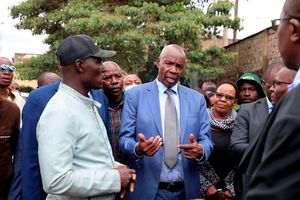‘Had I been taught about sexual and reproductive health in school, I would not be the teen mother that I am today’

Diaphragm Vaginal Contraceptive Ring
What you need to know:
- The boy responsible went ahead to clear his high school education, does not take care of the child, and has moved on with another girl.
- Zainabu, on the other hand, is a teenage single mother who is struggling to fend for her child and siblings, being the firstborn. Her parents are not well-off.
When Zainabu Afande* borrowed her cousin’s house keys one afternoon in 2021, the cousin didn’t read much into it. He thought Zainabu only wanted to clean the house for him, something she had done before. But Khadijah had a different plan, a plan that would change the course of her life forever. Aged 15 then and a Form One student, Zainabu met a boy and they started dating.
“It was during the long Covid-holiday and I met this guy from Dagoretti High School. He was in Form Three. We dated for two months before the announcement on returning to school was made. I was so invested in the relationship, and I really wanted it to work out. I hoped we would grow old together,” says Zainabu with a distant look.
On the day that her boyfriend was to go back to school, Zainabu borrowed her cousin’s house keys so that she and her boyfriend could spend some “quality” time together. He was in boarding school, so it would take a while before they met again.
“It is at my cousin’s house that we had sex. This was my first time, and I ended up pregnant. I had never known that one can get pregnant from a first-time sexual encounter, and so I did not care to use any contraceptives or protection. Had I known, I would have cautioned myself, and my studies wouldn’t have been interrupted,” she says, balancing tears.
The boy responsible went ahead to clear his high school education, does not take care of the child, and has moved on with another lady.
Zainabu, on the other hand, is a teen mother who is struggling to care and provide for her household, being the firstborn. Her parents are not well-off.
One thing she kept saying during our interview is that she wishes sex education was taught in schools.
“I would have escaped this and my life would be different. Here in the slums, our parents have no time to talk to us about sex and reproductive health, but they at least strive to enroll us in schools. I wish this topic could be introduced in the curriculum as it would save many girls who are like me.“
Zainabu is not alone in such a plight. Her neighbour and friend, Julliet Tabuni*, found herself in the same predicament four years ago. She had never heard of contraceptives, but after delivering and going back to school, she is on a family planning method that was proposed to her by a friend. She is not very conversant with the side effects, but she is at least confident that she will not get pregnant anytime soon, so she can concentrate on her studies (currently in Form Four) and on providing for her three-year old daughter.
According to the Kenya Demographic Health Survey (KDHS) 2022 report, 15 percent of women aged 15-19 have ever been pregnant; 12 percent had a live birth, one percent had a pregnancy loss, and three percent are pregnant with their first child.
It was also discovered that the rate of teenage pregnancy declines as the level of education increases, from 38 percent for women with no education to five percent for women with more than secondary education. With teenage pregnancy, young women are at risk of other sexual and reproductive health factors that include exposure to HIV and STIs, unsafe abortion, physical violence, and early marriages.
The aftermath of these is a burden to the economy and increased poverty due to levels of dependency. Adolescents and young women, being a key population, have also been denied an opportunity to learn about sexual health in school, with others turning it a factor of immorality, claiming that it increases the sexual debut and the rates of abortions, which is not true.
In Kibera slums, where Zainabu and Juliet hail from, the Network for Adolescent and Youth of Africa (Naya), a youth-led regional advocacy network, is intentionally connecting teen mothers to service providers who give them personalised services depending on their SHRH needs, as well as economic empowerment firms. Their goal is to facilitate an environment that fosters the empowerment of adolescent and youth sexual and reproductive health and rights.
According to Robert Aseda, the head of programmes at Naya, the organisation is focused on strengthening teen mothers’ meaningful engagement in the decision-making process.
“Despite their unique needs, their voices are not integrated into decision-making processes. We train them on how to advocate for their own issues through available public participation forums. When policies and budgets are being developed by the county and national governments, we equip them to be able to prepare memoranda with key requests, including more youth-friendly health facilities, return to school policies, and empowerment programs, among others,” said Mr Aseda.
“Further, we refer them to our partners doing service delivery and to public facilities providing youth-friendly services to ensure they can access the sexual and reproductive health services that they need, including education, contraceptives, and access to services on sexual and gender-based violence.”
In Kenya, sex education is not offered at any school level, and this has been a highly contentious issue. In August this year, Kenya’s Conference of Catholic Bishops said it opposes the sex education content in the country’s primary education curriculum, citing flaws in the curriculum’s “permissive” framing and design. They further said the curriculum’s content would contribute to the rate of teen pregnancies and exacerbate moral decline.
Prof Charles Ong’ondo, the CEO at the Kenya Institute of Curriculum Development, said they have no plans to introduce sex education in the curriculum.
“We cannot introduce sex education in our primary and secondary school curriculum because the stakeholders have not concurred on the matter, yet their approval is very critical to curriculum development,” he said.





